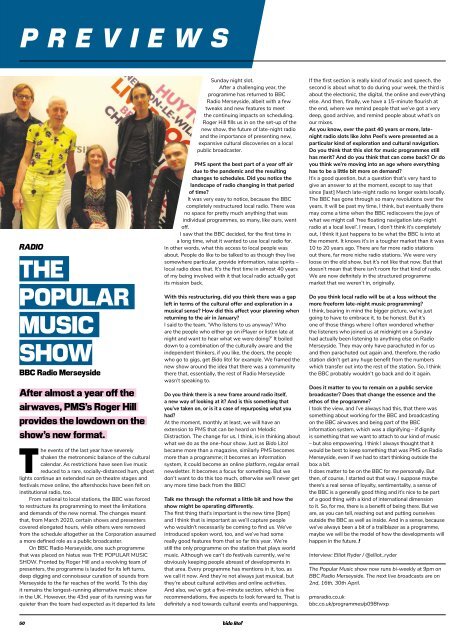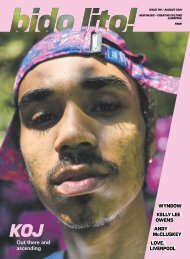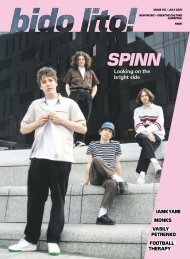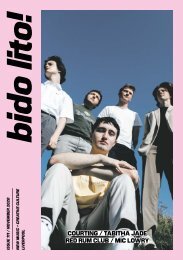Issue 113 / April-May 2021
April-May 2021 issue of Bido Lito! magazine. Featuring: PIXEY, AYSTAR, SARA WOLFF, DIALECT, AMBER JAY, JANE WEAVER, TATE COLLECTIVE, DEAD PIGEON GALLERY, DAVID ZINK YI, SAM BATLEY, FURRY HUG, FELIX MUFTI-WRIGHT, STEALING SHEEP and much more.
April-May 2021 issue of Bido Lito! magazine. Featuring: PIXEY, AYSTAR, SARA WOLFF, DIALECT, AMBER JAY, JANE WEAVER, TATE COLLECTIVE, DEAD PIGEON GALLERY, DAVID ZINK YI, SAM BATLEY, FURRY HUG, FELIX MUFTI-WRIGHT, STEALING SHEEP and much more.
Create successful ePaper yourself
Turn your PDF publications into a flip-book with our unique Google optimized e-Paper software.
PREVIEWS<br />
RADIO<br />
THE<br />
POPULAR<br />
MUSIC<br />
SHOW<br />
BBC Radio Merseyside<br />
After almost a year off the<br />
airwaves, PMS’s Roger Hill<br />
provides the lowdown on the<br />
show’s new format.<br />
The events of the last year have severely<br />
shaken the metronomic balance of the cultural<br />
calendar. As restrictions have seen live music<br />
reduced to a rare, socially-distanced hum, ghost<br />
lights continue an extended run on theatre stages and<br />
festivals move online, the aftershocks have been felt on<br />
institutional radio, too.<br />
From national to local stations, the BBC was forced<br />
to restructure its programming to meet the limitations<br />
and demands of the new normal. The changes meant<br />
that, from March 2020, certain shows and presenters<br />
covered elongated hours, while others were removed<br />
from the schedule altogether as the Corporation assumed<br />
a more defined role as a public broadcaster.<br />
On BBC Radio Merseyside, one such programme<br />
that was placed on hiatus was THE POPULAR MUSIC<br />
SHOW. Fronted by Roger Hill and a revolving team of<br />
presenters, the programme is lauded for its left turns,<br />
deep digging and connoisseur curation of sounds from<br />
Merseyside to the far reaches of the world. To this day<br />
it remains the longest-running alternative music show<br />
in the UK. However, the 43rd year of its running was far<br />
quieter than the team had expected as it departed its late<br />
Sunday night slot.<br />
After a challenging year, the<br />
programme has returned to BBC<br />
Radio Merseyside, albeit with a few<br />
tweaks and new features to meet<br />
the continuing impacts on scheduling.<br />
Roger Hill fills us in on the set-up of the<br />
new show, the future of late-night radio<br />
and the importance of presenting new,<br />
expansive cultural discoveries on a local<br />
public broadcaster.<br />
PMS spent the best part of a year off air<br />
due to the pandemic and the resulting<br />
changes to schedules. Did you notice the<br />
landscape of radio changing in that period<br />
of time?<br />
It was very easy to notice, because the BBC<br />
completely restructured local radio. There was<br />
no space for pretty much anything that was<br />
individual programmes, so many, like ours, went<br />
off.<br />
I saw that the BBC decided, for the first time in<br />
a long time, what it wanted to use local radio for.<br />
In other words, what this access to local people was<br />
about. People do like to be talked to as though they live<br />
somewhere particular, provide information, raise spirits –<br />
local radio does that. It’s the first time in almost 40 years<br />
of my being involved with it that local radio actually got<br />
its mission back.<br />
With this restructuring, did you think there was a gap<br />
left in terms of the cultural offer and exploration in a<br />
musical sense? How did this affect your planning when<br />
returning to the air in January?<br />
I said to the team, ‘Who listens to us anyway? Who<br />
are the people who either go on iPlayer or listen late at<br />
night and want to hear what we were doing?’ It boiled<br />
down to a combination of the culturally aware and the<br />
independent thinkers, if you like, the doers, the people<br />
who go to gigs, get Bido lito! for example. We framed the<br />
new show around the idea that there was a community<br />
there that, essentially, the rest of Radio Merseyside<br />
wasn’t speaking to.<br />
Do you think there is a new frame around radio itself,<br />
a new way of looking at it? And is this something that<br />
you’ve taken on, or is it a case of repurposing what you<br />
had?<br />
At the moment, monthly at least, we will have an<br />
extension to PMS that can be heard on Melodic<br />
Distraction. The change for us, I think, is in thinking about<br />
what we do as the one-hour show. Just as Bido Lito!<br />
became more than a magazine, similarly PMS becomes<br />
more than a programme; it becomes an information<br />
system, it could become an online platform, regular email<br />
newsletter. It becomes a focus for something. But we<br />
don’t want to do this too much, otherwise we’ll never get<br />
any more time back from the BBC!<br />
Talk me through the reformat a little bit and how the<br />
show might be operating differently.<br />
The first thing that’s important is the new time [9pm]<br />
and I think that is important as we’ll capture people<br />
who wouldn’t necessarily be coming to find us. We’ve<br />
introduced spoken word, too, and we’ve had some<br />
really good features from that so far this year. We’re<br />
still the only programme on the station that plays world<br />
music. Although we can’t do festivals currently, we’re<br />
obviously keeping people abreast of developments in<br />
that area. Every programme has mentions in it, too, as<br />
we call it now. And they’re not always just musical, but<br />
they’re about cultural activities and online activities.<br />
And also, we’ve got a five-minute section, which is five<br />
recommendations, five aspects to look forward to. That is<br />
definitely a nod towards cultural events and happenings.<br />
If the first section is really kind of music and speech, the<br />
second is about what to do during your week, the third is<br />
about the electronic, the digital, the online and everything<br />
else. And then, finally, we have a 15-minute flourish at<br />
the end, where we remind people that we’ve got a very<br />
deep, good archive, and remind people about what’s on<br />
our mixes.<br />
As you know, over the past 40 years or more, latenight<br />
radio slots like John Peel’s were presented as a<br />
particular kind of exploration and cultural navigation.<br />
Do you think that this slot for music programmes still<br />
has merit? And do you think that can come back? Or do<br />
you think we’re moving into an age where everything<br />
has to be a little bit more on demand?<br />
It’s a good question, but a question that’s very hard to<br />
give an answer to at the moment, except to say that<br />
since [last] March late-night radio no longer exists locally.<br />
The BBC has gone through so many revolutions over the<br />
years. It will be past my time, I think, but eventually there<br />
may come a time when the BBC rediscovers the joys of<br />
what we might call ‘free floating navigation late-night<br />
radio at a local level’. I mean, I don’t think it’s completely<br />
out, I think it just happens to be what the BBC is into at<br />
the moment. It knows it’s in a tougher market than it was<br />
10 to 20 years ago. There are far more radio stations<br />
out there, far more niche radio stations. We were very<br />
loose on the old show, but it’s not like that now. But that<br />
doesn’t mean that there isn’t room for that kind of radio.<br />
We are now definitely in the structured programme<br />
market that we weren’t in, originally.<br />
Do you think local radio will be at a loss without the<br />
more freeform late-night music programming?<br />
I think, bearing in mind the bigger picture, we’re just<br />
going to have to embrace it, to be honest. But it’s<br />
one of those things where I often wondered whether<br />
the listeners who joined us at midnight on a Sunday<br />
had actually been listening to anything else on Radio<br />
Merseyside. They may only have parachuted in for us<br />
and then parachuted out again and, therefore, the radio<br />
station didn’t get any huge benefit from the numbers<br />
which transfer out into the rest of the station. So, I think<br />
the BBC probably wouldn’t go back and do it again.<br />
Does it matter to you to remain on a public service<br />
broadcaster? Does that change the essence and the<br />
ethos of the programme?<br />
I took the view, and I’ve always had this, that there was<br />
something about working for the BBC and broadcasting<br />
on the BBC airwaves and being part of the BBC<br />
information system, which was a dignifying – if dignity<br />
is something that we want to attach to our kind of music<br />
– but also empowering. I think I always thought that it<br />
would be best to keep something that was PMS on Radio<br />
Merseyside, even if we had to start thinking outside the<br />
box a bit.<br />
It does matter to be on the BBC for me personally. But<br />
then, of course, I started out that way. I suppose maybe<br />
there’s a real sense of loyalty, sentimentality, a sense of<br />
the BBC is a generally good thing and it’s nice to be part<br />
of a good thing with a kind of international dimension<br />
to it. So, for me, there is a benefit of being there. But we<br />
are, as you can tell, reaching out and putting ourselves<br />
outside the BBC as well as inside. And in a sense, because<br />
we’ve always been a bit of a trailblazer as a programme,<br />
maybe we will be the model of how the developments will<br />
happen in the future. !<br />
Interview: Elliot Ryder / @elliot_ryder<br />
The Popular Music show now runs bi-weekly at 9pm on<br />
BBC Radio Merseyside. The next live broadcasts are on<br />
2nd, 16th, 30th <strong>April</strong>.<br />
pmsradio.co.uk<br />
bbc.co.uk/programmes/p098fwxp<br />
50

















